最新人教版九年级英语第一单元知识点总结
- 格式:docx
- 大小:25.11 KB
- 文档页数:8
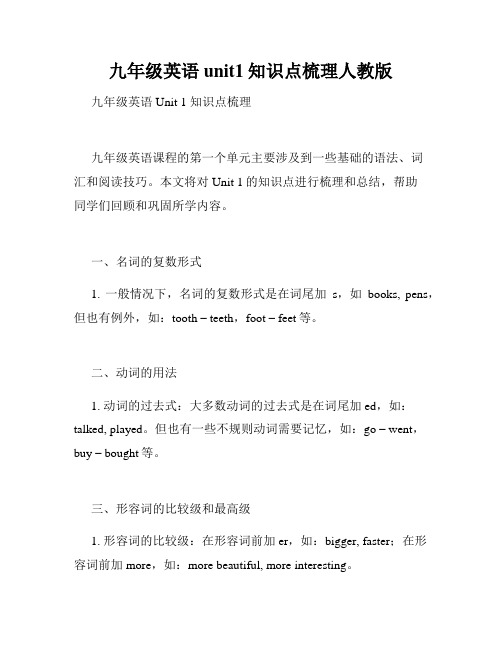
九年级英语unit1知识点梳理人教版九年级英语Unit 1 知识点梳理九年级英语课程的第一个单元主要涉及到一些基础的语法、词汇和阅读技巧。
本文将对Unit 1的知识点进行梳理和总结,帮助同学们回顾和巩固所学内容。
一、名词的复数形式1. 一般情况下,名词的复数形式是在词尾加s,如books, pens,但也有例外,如:tooth – teeth,foot – feet等。
二、动词的用法1. 动词的过去式:大多数动词的过去式是在词尾加ed,如:talked, played。
但也有一些不规则动词需要记忆,如:go – went,buy – bought等。
三、形容词的比较级和最高级1. 形容词的比较级:在形容词前加er,如:bigger, faster;在形容词前加more,如:more beautiful, more interesting。
四、连接词的用法1. and:表示并列关系,连接两个相同级别的词、短语或句子,如:I like apples and oranges.2. but:表示转折关系,连接两个相反或对比的词、短语或句子,如:I want to go swimming, but it's raining.3. or:表示选择关系,连接两个可替换的词、短语或句子,如:Do you want tea or coffee?4. so:表示因果关系,连接原因和结果,如:He studied hard,so he passed the exam.5. because:表示原因关系,连接原因和结果,如:I stayed at home because it was raining.五、阅读技巧1. 阅读理解题:在阅读理解题中,要仔细阅读文章,理解文章的大意和细节,然后根据题目要求选择正确的答案。
2. 短文填空题:在短文填空题中,要根据短文的语境和逻辑关系,选择适当的单词或短语填入空格中,使短文通顺和完整。

人教版初三英语第一单元知识点一、重点词汇1. textbook /ˈtekstbʊk/ 教科书;课本2. conversation /ˌkɒnvəˈseɪʃn/ 交谈;谈话3. aloud /əˈlaʊd/ 大声地;出声地4. pronunciation /prəˌnʌnsiˈeɪʃn/ 发音;读音5. sentence /ˈsentəns/ 句子6. patient /ˈpeɪʃnt/ 有耐心的;n. 病人7. expression /ɪkˈspreʃn/ 表情;表示;表达方式8. discover /dɪˈskʌvə(r)/ 发现;发觉9. secret /ˈsiːkrət/ 秘密;秘诀;adj. 秘密的;保密的10. grammar /ˈɡræmə(r)/ 语法二、重点短语1. look up 查阅;抬头看2. be patient with 对……有耐心3. pay attention to 注意;关注4. connect...with... 把……和……连接或联系起来5. make mistakes 犯错误6. depend on 取决于;依靠7. be interested in 对……感兴趣8. take notes 做笔记9. make sentences 造句三、重点句型1. —How do you study for a test? 你是怎样为考试而学习的?—I study by working with a group. 我通过和小组一起学习。
2. It's too hard to understand spoken English. 听懂英语口语太难了。
3. The more you read, the faster you'll be. 你读得越多,你就会读得越快。
4. Why did Wei Fen find it difficult to learn English? 为什么魏芬觉得学英语很难?5. I was afraid to ask questions because of my poor pronunciation. 因为我的发音不好,我害怕问问题。

Unit 1 How can we become good learners?1.textbook [ˈtekstbʊk]n.教科书;课本→text [ˈtekst]n.文本;课文2.conversation[ˌkɒnvəˈseɪʃn] n.交谈;谈话have a conversation with sb. 与某人对话;交谈make a conversation 编对话3.aloud [əˈlaʊd]adv.大声地;出声地read...aloud 大声朗读...speaking louder 说大声点4.pronunciation [prəˌnʌnsiˈeɪʃn]n.发音;读音→pronounce [prəˈnaʊns]v.发音5.sentence[sentəns]n.句子make a sentence 造句6.patient[ˈpeɪʃnt]adj.有耐心的n.病人→反:impatient adj.不耐烦的;没有耐心的→ patiently adv. 耐心地=with patience →patience n.耐心★be patient with sb. 对某人有耐心7.expression [ɪkˈspreʃn]n.表情;表达(方式);表示→ express [ɪkˈspres] v.表达;表述, 表示8.discover[dɪˈskʌvə(r)]v.发觉;发现(本身就存在的事物)→discovery [dɪˈskʌvəri] n. 发现;发觉9.secret[ˈsiːkrət]n.秘密;秘诀adj.秘密的;保密的→secretly adv.秘密地→secretary [ˈsekrətri] n. 秘书in secret 偷偷地;暗暗地keep a / the secret 保守秘密10.look up (在词典、参考书或通过电脑)查阅;抬头看look 相关的一些短语:look up …(in the dictionary) 查(字典),查找look through 快速阅读,翻看, 浏览look out 当心;留心= watch outlook after 照看,照顾look for... 寻找... look like... 看起来像...look at... 看... take / have a look (at…) 看一看...look forward to (doing) sth. 期待(做)某事look back on/at 回顾,回忆,回首(往事)11.grammar[ˈɡræmə(r)]n.语法12.repeat[rɪˈpiːt]v.重复;重做13.note [nəʊt]n.笔记;记录v.注意;指出→ notebook n. 笔记本make notes = take notes 记笔记14.pal[pæl]n.朋友;伙伴 a pen pal 笔友15.physics[ˈfɪzɪks]n.物理;物理学→ physical [ˈfɪzɪkl]adj. 身体的;物理学的16.chemistry [ˈkemɪstri] n.化学→chemical [ˈkemɪkl]adj.化学的→ chemist [ˈkemɪst]n. 化学家,药剂师17. memorize ['meməraiz] v. 记忆;记住→memory [ˈmeməri]n.记忆复数: memories18.pattern[ˈpætn]n.模式;方式19.pronounce[prəˈnaʊns] v.发音→ pronunciation[prəˌnʌnsiˈeɪʃn]n.发音;读音20.increase[ɪnˈkriːs]v.增加;增长→反: decrease v. 减少;降低/ reduce v. 减少;缩小★increase by…增加了…increase to….增加到….21.speed[spi:d]n.速度v.加速(speed-sped-sped)speed up 加速at speed 高速,快地at a speed of ... 以....速度22.partner[pa:(r)tnə(r)]n.搭档;同伴→ part n.部分;角色;地区v.分开23.born [ bɔ:n] v.出生adj. 天生的→ birth n.出生give birth to...生育...at birth 在出生时= when sb./sth. was born → birthday n.生日be born in + 年/月be born on + 日期be born with…天生具有…be born + adj. He was born blind.24.be born with 天生具有25.ability[ə’biləti]n.能力;才能★have the ability to do sth. 有做某事的能力→ able adj. 有能力的,能够的→反:unable → disabled adj. 肢体残疾的be able to do sth. 有能力做某事→反:be unable(=not able)to do sth.26.create [kriˈeɪt] v.创造;创建→creation [kriˈeɪʃn]n..创造→ creator n.创造者→ creative [kriˈeɪtɪv] adj.有创造力的→ creativity [ˌkri: eɪˈtɪvəti] n.创造力,创造性27.brain[breɪn]n.大脑brain storm 头脑风暴28.active[ˈæktɪv]adj.活跃的;积极的→ act n. & v. 行为;举动→ actor/actress n.男演员/女演员→ action n. 行动;行为→ activity n. 活动(复数): activities29.attention [əˈtenʃn]n.注意;关注30.pay attention to(to是介词)注意;关注31.connect [kəˈnekt]v.(使)连接;与⋯⋯有联系→ connection n.连接;联系32.connect … with... 把...和...连接或联系起来33.overnight[ˌəʊvəˈnaɪt]adv.一夜之间;在夜间→ night n. 夜;黑夜at night/ in the night在夜里→ tonight adv.在今夜;在今晚→ midnight n. 半夜at midnight 在半夜until midnight 直到半夜34.review[rɪˈvjuː] v. & n.回顾;复习= go over →反:preview v.&n. 预习;预览→view n.看法,意见;视野v. 看待;查看→ interview n.&v. 面试;采访35.knowledge[ˈnɒlɪdʒ][U.]知识;学问→ knowledgeable [ˈnɒlɪdʒəbl] adj. 有知识的;知识渊博的36.lifelong adj.终身的;毕生的37.wisely adv. 明智地;聪明地→ wise adj.明智的→ wisdom n.智慧。
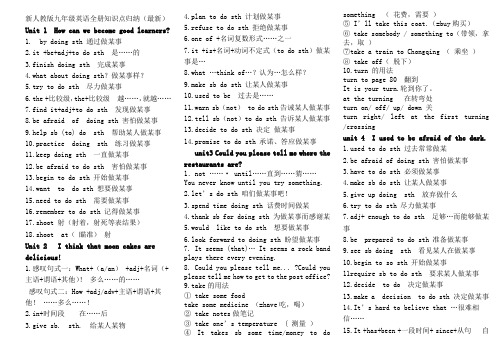
新人教版九年级英语全册知识点归纳(最新)Unit 1 How can we become good learners?1. by doing sth 通过做某事2.it +be+adj+to do sth 是……的3.finish doing sth 完成某事4.what about doing sth?做某事样?5.try to do sth 尽力做某事6.the +比较级,the+比较级越……,就越……7.find it+adj+to do sth 发现做某事8.be afraid of doing sth 害怕做某事9.help sb (to) do sth 帮助某人做某事10.practice doing sth 练习做某事11.keep doing sth 一直做某事12.be afraid to do sth 害怕做某事13.begin to do sth 开始做某事14.want to do sth 想要做某事15.need to do sth 需要做某事16.remember to do sth 记得做某事17.shoot 射(射着,射死等表结果)18.shoot at(瞄准)射Unit 2 I think that moon cakes are delicious!1.感叹句式一:What+(a/an) +adj+名词(+主语+谓语+其他)!多么……的……感叹句式二:How +adj/adv+主语+谓语+其他!……多么……!2.in+时间段在……后3.give sb. sth. 给某人某物4.plan to do sth 计划做某事5.refuse to do sth 拒绝做某事6.one of +名词复数形式……之一7.it +is+名词+动词不定式(to do sth)做某事是…8.what …think of…?认为…怎么样?9.make sb do sth 让某人做某事ed to be 过去是……11.warn sb(not) to do sth告诫某人做某事12.tell sb(not)to do sth 告诉某人做某事13.decide to do sth 决定做某事14.promise to do sth 承诺、答应做某事unit3 Could you please tell me where therestaurants are?1.not ……· until……直到……猜……You never know until you try something.2.let’s do sth 咱们做某事吧!3.spend time doing sth 话费时间做某4.thank sb for doing sth 为做某事而感谢某5.would like to do sth 想要做某事6.look forward to doing sth 盼望做某事7. It seems (that)… It seems a rock bandplays there every evening.8. Could you please tell me... ?Could youplease tell me how to get to the post office?9.take的用法① take some foodtake some medicine (=have吃,喝)② take notes做笔记③take one’s temperature ( 测量)④It takes sb some time/money to dosomething (花费,需要)⑤I’ll take this coat.(=buy购买)⑥ take somebody / something to(带领,拿去,取)⑦take a train to Chongqing (乘坐)⑧ take off(脱下)10.turn 的用法turn to page 80 翻到It is your turn.轮到你了。
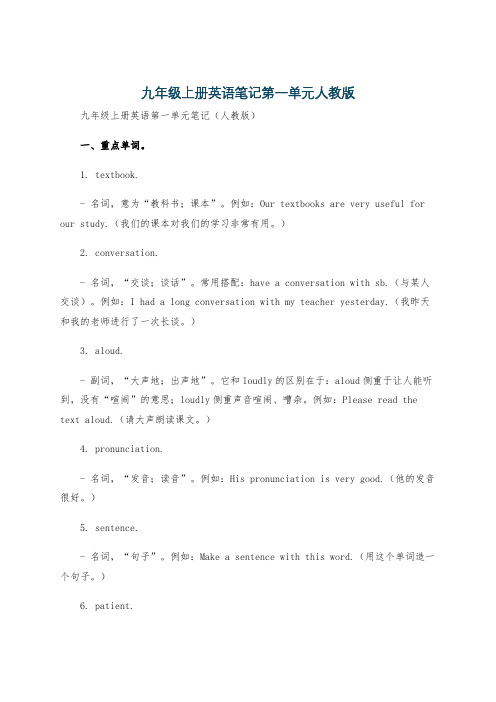
九年级上册英语笔记第一单元人教版九年级上册英语第一单元笔记(人教版)一、重点单词。
1. textbook.- 名词,意为“教科书;课本”。
例如:Our textbooks are very useful for our study.(我们的课本对我们的学习非常有用。
)2. conversation.- 名词,“交谈;谈话”。
常用搭配:have a conversation with sb.(与某人交谈)。
例如:I had a long conversation with my teacher yesterday.(我昨天和我的老师进行了一次长谈。
)3. aloud.- 副词,“大声地;出声地”。
它和loudly的区别在于:aloud侧重于让人能听到,没有“喧闹”的意思;loudly侧重声音喧闹、嘈杂。
例如:Please read the text aloud.(请大声朗读课文。
)4. pronunciation.- 名词,“发音;读音”。
例如:His pronunciation is very good.(他的发音很好。
)5. sentence.- 名词,“句子”。
例如:Make a sentence with this word.(用这个单词造一个句子。
)6. patient.- 形容词,“有耐心的”;名词,“病人”。
例如:Our English teacher is very patient with us.(我们的英语老师对我们非常有耐心。
)- be patient with sb.(对某人有耐心)7. secret.- 名词,“秘密;秘诀”;形容词,“秘密的;保密的”。
例如:It's a secret between us.(这是我们之间的秘密。
)8. look up.- 动词短语,“(在词典、参考书中或通过电脑)查阅;抬头看”。
例如:If you don't know this word, you can look it up in the dictionary.(如果你不知道这个单词,你可以在词典里查阅它。

人教版九年级全一册英语Unit1单元语法知识点总结本单元重点短语的具体用法1. Good learners:优秀的学习者。
例如:Good learners always find ways to improve their study.(优秀的学习者总是找到方法来提高他们的学习。
)2. Work with friends:和朋友一起学习。
例如:It's better to work with friends to study.(和朋友一起学习会更好。
)3. Study for a test:备考。
例如:I need to study for the math test tomorrow.(我需要为明天的数学考试备考。
)4. Have conversations with:与……交谈。
例如:I like having conversations with my English teacher.(我喜欢和我的英语老师交谈。
)5. Speaking skills:口语技巧。
例如:Improving speaking skills requires a lot of practice.(提高口语技巧需要大量的练习。
)6. A little:有点儿。
例如:I'm a little tired today.(我今天有点儿累。
)7. At first:起初,起先。
例如:At first, I found it difficult to learn English.(起初,我发现学习英语很困难。
)8. The secret to...:……的秘诀。
例如:The secret to success is hard work.(成功的秘诀是努力工作。
)9. Because of:因为。
例如:Because of the rain, we had to cancel the picnic.(因为下雨,我们不得不取消野餐。
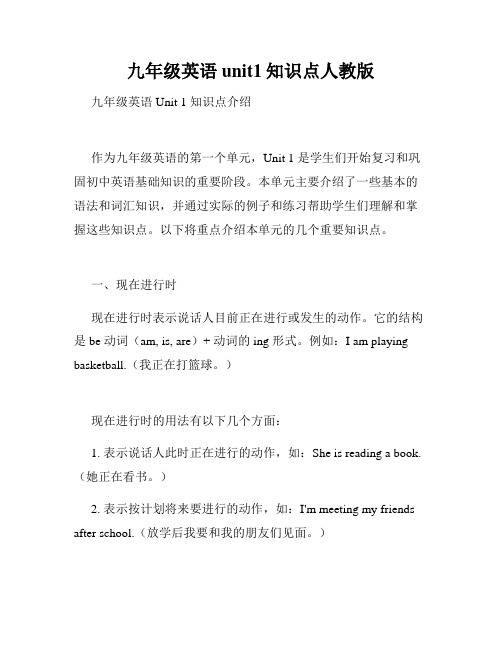
九年级英语unit1知识点人教版九年级英语 Unit 1 知识点介绍作为九年级英语的第一个单元,Unit 1 是学生们开始复习和巩固初中英语基础知识的重要阶段。
本单元主要介绍了一些基本的语法和词汇知识,并通过实际的例子和练习帮助学生们理解和掌握这些知识点。
以下将重点介绍本单元的几个重要知识点。
一、现在进行时现在进行时表示说话人目前正在进行或发生的动作。
它的结构是 be 动词(am, is, are)+ 动词的 ing 形式。
例如:I am playing basketball.(我正在打篮球。
)现在进行时的用法有以下几个方面:1. 表示说话人此时正在进行的动作,如:She is reading a book.(她正在看书。
)2. 表示按计划将来要进行的动作,如:I'm meeting my friends after school.(放学后我要和我的朋友们见面。
)3. 表示现阶段临时的状况或现阶段正在发生的事情,如:He is studying in Australia these days.(他这些天正在澳大利亚学习。
)二、形容词和副词的比较级和最高级形容词有比较级和最高级两种形式。
通常在两个人或物之间进行比较时使用。
形容词比较级的构成是在词尾加 -er,最高级的构成是在词尾加-est。
如果形容词以字母 e 结尾,只需加 r 或 st。
例如:big - bigger - biggest(大 - 更大 - 最大)副词的比较级和最高级的构成与形容词相同,只需在词尾加上-er 或 -est。
例如:fast - faster - fastest(快 - 更快 - 最快)形容词和副词的比较级和最高级的用法上一般遵循以下几个规则:1. 一般短词用 er 或 est,如:tall - taller - tallest(高 - 更高 - 最高)2. 以字母 e 结尾的词只加 r 或 st,如:large - larger - largest(大- 更大 - 最大)3. 以辅音字母加 y 结尾的双音节词,变 y 为 i 后再加 er 或 est,如:happy - happier - happiest(快乐 - 更快乐 - 最快乐)三、否定句和疑问句的构成在英语中,构成否定句和疑问句需要使用助动词 do 或 does,do 用于一般现在时的句子,does 用于第三人称单数。
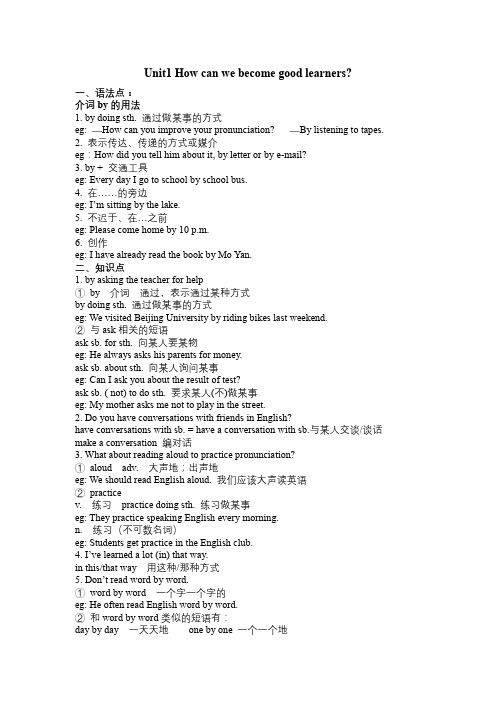
Unit1 How can we become good learners?一、语法点:介词by的用法1. by doing sth. 通过做某事的方式eg: —How can you improve your pronunciation? —By listening to tapes.2. 表示传达、传递的方式或媒介eg:How did you tell him about it, by letter or by e-mail?3. by + 交通工具eg: Every day I go to school by school bus.4. 在……的旁边eg: I’m sitting by the lake.5. 不迟于、在…之前eg: Please come home by 10 p.m.6. 创作eg: I have already read the book by Mo Yan.二、知识点1. by asking the teacher for help①by 介词通过,表示通过某种方式by doing sth. 通过做某事的方式eg: We visited Beijing University by riding bikes last weekend.②与ask相关的短语ask sb. for sth. 向某人要某物eg: He always asks his parents for money.ask sb. about sth. 向某人询问某事eg: Can I ask you about the result of test?ask sb. ( not) to do sth. 要求某人(不)做某事eg: My mother asks me not to play in the street.2. Do you have conversations with friends in English?have conversations with sb. = have a conversation with sb.与某人交谈/谈话make a conversation 编对话3. What about reading aloud to practice pronunciation?①aloud adv. 大声地;出声地eg: We should read English aloud. 我们应该大声读英语②practicev. 练习practice doing sth. 练习做某事eg: They practice speaking English every morning.n. 练习(不可数名词)eg: Students get practice in the English club.4. I’ve learned a lot (in) that way.in this/that way 用这种/那种方式5. Don’t read word by word.①word by word 一个字一个字的eg: He often read English word by word.②和word by word类似的短语有:day by day 一天天地one by one 一个一个地6. Well, be patient. It takes time.patientadj.耐心的①be patient with sb. 对某人有耐心eg: Our teachers are patient with us.②be patient to do sth. 有耐心做某事eg: Teachers should be patient to teach students.n. 病人eg: There are many patients in the hospital.7. The more you read, the faster you’ll be.the+比较级,the+比较级越…… 越……eg: The more you practice, the better you can understand.8. Why did Wei Fen find it difficult to learn English?find it + adj. + (for sb.) + to do sth. 发现做某事(对于某人)是…make it + adj.+ (for sb.) + to do sth. 使(某人)做某事成为…think it + adj. + (for sb.) + to do sth. 认为做某事(对于某人)是…feel it + adj. + (for sb.) + to do sth. 感觉做某事(对于某人)是…eg: Computers make it easier to keep in touch with friends.电脑使我们获得消息更容易了。
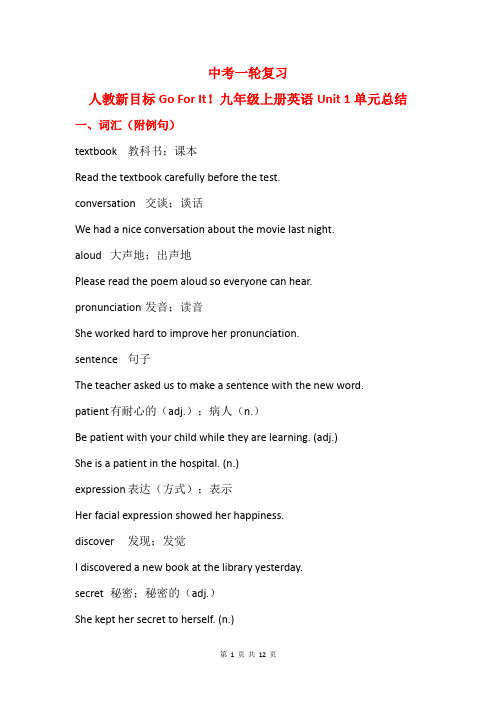
中考一轮复习人教新目标Go For It!九年级上册英语Unit 1单元总结一、词汇(附例句)textbook教科书;课本Read the textbook carefully before the test.conversation交谈;谈话We had a nice conversation about the movie last night.aloud大声地;出声地Please read the poem aloud so everyone can hear.pronunciation发音;读音She worked hard to improve her pronunciation.sentence句子The teacher asked us to make a sentence with the new word. patient有耐心的(adj.);病人(n.)Be patient with your child while they are learning. (adj.)She is a patient in the hospital. (n.)expression表达(方式);表示Her facial expression showed her happiness.discover发现;发觉I discovered a new book at the library yesterday.secret秘密;秘密的(adj.)She kept her secret to herself. (n.)This is a secret room in the house. (adj.)grammar语法I need to brush up on my grammar skills.repeat重复;重做Repeat the steps carefully to avoid mistakes.note笔记;记录(n.);注意;指出(v.)She took notes during the lecture. (n.)Please note that the deadline is next Friday. (v.)pal朋友;伙伴(非正式用语)My best pal and I have been friends since childhood.pattern模式;方式He found a pattern in the data that helped him solve the problem. physics物理学I enjoy studying physics because it's interesting.chemistry化学Chemistry is the study of matter and its interactions.partner搭档;同伴We worked on the project as partners.memorize记住;熟记Memorize these key points for the exam.increase增加;增长The population has increased significantly in recent years.speed速度(n.);加速(v.)She drove at a high speed on the highway. (n.)He sped up the car to pass the slow traffic. (v.)ability能力;才能She has a natural ability for music.brain大脑The brain is the control center of the body.active活跃的;积极的She is an active member of the school club.attention注意;关注Pay attention to the details of the problem.connect连接;与……有联系(v.);连接(n.)Connect the wires correctly to avoid sparks. (v.)The internet allows us to connect with people around the world. (n.) overnight一夜之间;在夜间The project was completed overnight by a team of experts.review回顾;复习She spent the evening reviewing her notes for the test. knowledge知识;学问She has a wealth of knowledge in ancient history.wisely明智地;聪明地He made a wise decision to invest in that company.二、短语知识(附例句)by making word cards 通过制作单词卡片释义:这是一种学习新单词的方法,通过制作卡片来加深记忆。

人教版九年级英语Unit 1 重要语法知识点总结1.do sth. by doing sth. 通过做某事来做某事Eg:I study English by listening to tapes. 我通过听磁带来学习英语。
2.介词by的用法①.by+交通工具①by+地点,“靠近;在...旁边”Tom sits by the window in the classroom.①by+时间,“不迟于;在...之前”Mom told him to come back home by 10:00.①“由......所做”The music by Mozart is famous all over the world.①by doing sth.通过做某事I study English by reading the textbook.3.ask 相关短语①ask sb. for sth.向某人要某物。
He asked his parents for money.①ask sb. about sth.向某人询问某事Can I ask about the result of the match?我可以问一下比赛的结果吗?①ask sb.(not) to do sth.要求某人(不)做某事(被动语态)--be asked (not) to do sth.被要求(不)做某事My mother asked me not to play in the street.4.have conversations with friends in English和朋友用英语交谈5.speaking skills 口语技能spoken English 英语口语6.read aloud 朗读 a little nervous 有点儿紧张7.It’s +adj.+(for sb.)+to do sth.做某事对某人来说是怎么样的。
It’s easier for you to pay attention to it for a long time.对于你来说长时间集中注意力在它(你感兴趣的事儿)上面是也更容易的。
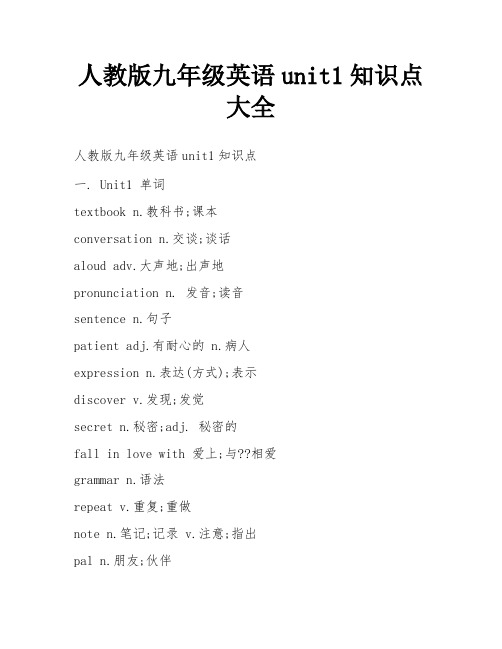
人教版九年级英语unit1知识点大全人教版九年级英语unit1知识点一. Unit1 单词textbook n.教科书;课本conversation n.交谈;谈话aloud adv.大声地;出声地pronunciation n. 发音;读音sentence n.句子patient adj.有耐心的 n.病人expression n.表达(方式);表示discover v.发现;发觉secret n.秘密;adj. 秘密的fall in love with 爱上;与??相爱grammar n.语法repeat v.重复;重做note n.笔记;记录 v.注意;指出pal n.朋友;伙伴pattern n.模式;方式physics n.物理;物理学chemistry n.化学partner n.搭档;同伴pronounce v.发音increase v.增加;增长speed n.速度 v.加速ability n.能力;才能brain n.大脑active adj.活跃的;积极的attention n.注意;关注pay attention to 注意;关注connect v.(使)连接;与??有联系connect…with... 把??和??连接或联系起来overnight adv.一夜之间;在夜间review v.& n.回顾;复习knowledge n.知识;学问wisely adv.明智地;聪明地Annie 安妮(女名)Alexander Graham Bell 格雷厄姆 ? 贝尔二.Unit1知识梳理Unit 1 How can we bee good learners?【重点短语】1. good learners 优秀的学习者2. work with friends 和朋友一起学习3. study for atest 备考4.have conversations with 与……交谈5.speaking skills 口语技巧6.a little 有点儿7.at first 起初起先8.the secret to... .......的秘诀9.because of 因为10.as well 也11.look up 查阅;抬头看12.so that 以便,为了13.the meaning of ……的意思14.make mistakes 犯错误15.talk to 交谈16.depend on 依靠依赖17.in mon 共有的18.pay attention to 注意关注19.connect …with …把……联系20.for example 例如21.think about 考虑22.even if 即使尽管纵容23.look for 寻找24.worry about 担心担忧25.make word cards 制作单词卡片26.ask the teacher for help 向老师求助27.read aloud 大声读28.spoken English 英语口语29.givea report 作报告30.word by word 一字一字地31. so……that 如此……以至于32.fall in love with 爱上33.something interesting 有趣的事情34.take notes 记笔记35.how often 多久一次36.a lot of 许多37.theability to do sth. 做某事的能力38.learning habits 学习习惯39.be interested in 对……感兴趣40.get bored 感到无聊【重点句型】1.提建议的句子:①What/ how about +doing sth.? 做…怎么样?如:What/ How about going shopping?②Why don't you + do sth.? 你为什么不做…?如:Why don't you go shopping?③Why not + do sth. ? 为什么不做…?如:Why not go shopping?④Let's + do sth. 让我们做…吧。
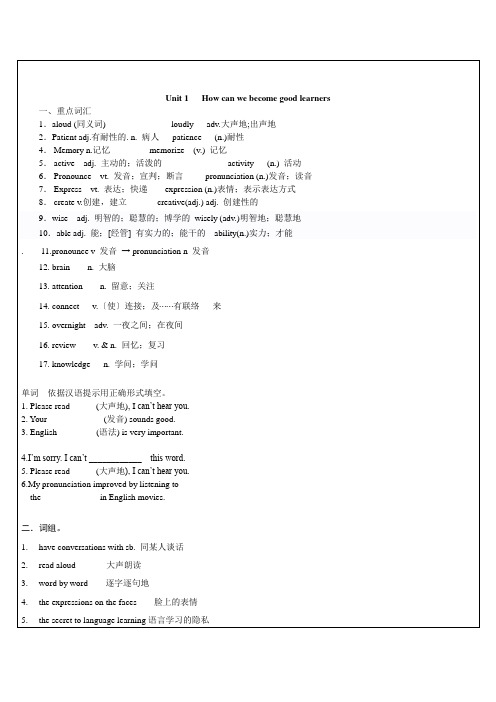
6.key words 关键词7.make mistakes in 在……方面犯错误8.be born with 天生具有9.depend on 取决于;依靠10.pay attention to〔介词〕留意,关注11.connect …with… 把……和……连接/联络起来12.Practice makes perfect 熟能生巧13.be stressed out 焦虑担心的;压力过大14.ask the teacher for help 向老师寻求扶植15.be afraid of doing sth/ be afraid to do sth 胆怯做某事16.fall in love with 爱上17.body language 肢体语言18.key words 关键词19.look up 查阅;向上看20.repeat out loud 大声跟读【Exercise】完成句子1.她说她通过做英语练习来学习语法.She said she studied grammar En glish exercises.2.你通过对话来练习英语口语吗Do you practice spoken English3.制作单词卡对学习英语单词很有扶植。
is very helpful to learn English words.4.我认为学习英语的最好方式是运用它。
I think the best way to learn English is.5.请问,你是怎样练习听力技能的Excuse me,do you practice6. 这两个国家有许多一样点。
The two countries have a lot __________ __________.7. 学习语言的时候,你不能胆怯犯错误。
When learning a language, you can’t __________ __________ __________ make mistakes.8. 大声朗读有助于你培育语感。
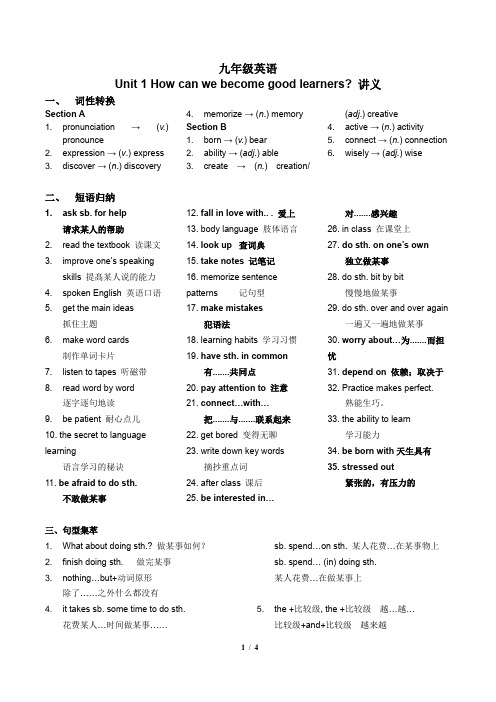
九年级英语Unit 1 How can we become good learners? 讲义一、词性转换Section A1. pronunciation → (v.)pronounce2. expression → (v.) express3. discover → (n.) discovery4. memorize → (n.) memorySection B1. born → (v.) bear2. ability → (adj.) able3. create → (n.) creation/(adj.) creative4. active → (n.) activity5. connect → (n.) connection6. wisely → (adj.) wise二、短语归纳1. ask sb. for help请求某人的帮助2.read the textbook 读课文3.improve one’s speakingskills 提髙某人说的能力4.spoken English 英语口语5.get the main ideas抓住主题6.make word cards制作单词卡片7.listen to tapes 听磁带8.read word by word逐字逐句地读9.be patient 耐心点儿10. the secret to language learning语言学习的秘诀11. be afraid to do sth.不敢做某事12. fall in love with.. . 爱上13. body language 肢体语言14. look up 查词典15. take notes 记笔记16. memorize sentencepatterns 记句型17. make mistakes犯语法18. learning habits 学习习惯19. have sth. in common有.......共同点20. pay attention to 注意21. connect…with…把.......与.......联系起来22. get bored 变得无聊23. write down key words摘抄重点词24. after class 课后25. be interested in…对.......感兴趣26. in class 在课堂上27. do sth. on one’s own独立做某事28. do sth. bit by bit慢慢地做某事29. do sth. over and over again一遍又一遍地做某事30. worry about…为.......而担忧31. depend on 依赖;取决于32. Practice makes perfect.熟能生巧。

人教版九年级英语第一单元必记知识点Unit 1 How can we ... learners?【重点短语】1. have conversation with sb. 同某人谈话2. too…to… 太……而不能3. the s ecret to… ……的秘诀4. be afraid of doing sth./ be afraid to do sth. 害怕做某事5. look up 查阅6. repeat out loud 大声跟读7. make mistakes in 在……方面犯错误8. connect ……with… 把……和……连接/联系起来9. get bored 感到厌烦10. be stressed out 焦虑不安的11. pay attention to 注意;关注12. depend on 取决于;依靠13. the ability to do sth.. 做某事的能力【考点详解】1. by + doing 通过……方式(by是介词,后面要跟动名词,也就是动词的ing形式)2. talk about 谈论,议论,讨论The students often talk about movie after class. 学生们常常在课后讨论电影。
talk to sb= talk with sb 与某人说话3. 提建议的句子:①What/ how about +doing sth.? 做…怎么样?(about后面要用动词的ing形式,这一点考试考的比较多)如:What/ How about going shopping?②Why don't you + do sth.? 你为什么不做…?如:Why don't you go shopping?③Why not + do sth. ? 为什么不做…?如:Why not go shopping?④Let's + do sth. 让我们做…...吧。

九年级英语1-3单元知识点人教版Unit 1 How can we become good learners?一、重点单词。
1. textbook:n. 教科书;课本。
2. conversation:n. 交谈;谈话。
3. aloud:adv. 大声地;出声地(区别于loud,loud可作形容词或副词,侧重声音响亮;aloud强调出声,能让人听见)4. pronunciation:n. 发音;读音。
5. sentence:n. 句子。
6. patient:adj. 有耐心的;n. 病人(be patient with sb. 对某人有耐心)7. expression:n. 表达(方式);表示。
8. discover:v. 发现;发觉(指发现原本存在但不为人知的事物)9. secret:n. 秘密;秘诀;adj. 秘密的;保密的(the secret to... ……的秘诀)10. look up:查阅;抬头看(look up a word in the dictionary在字典里查单词)二、重点短语。
1. by working with friends:通过和朋友一起学习。
2. make word cards:制作单词卡片。
3. read aloud:大声朗读。
4. practice doing sth.:练习做某事。
5. be afraid to do sth.:害怕做某事(be afraid of doing sth. 担心会发生某事)6. fall in love with:爱上;与……相爱。
7. as well:也(用于肯定句末,相当于too)8. look up to:钦佩;仰慕。
9. take notes:记笔记。
10. make mistakes in:在……方面犯错误。
三、重点句型。
1. How do you study for a test? 你如何为考试而学习?- I study by listening to tapes. 我通过听磁带学习。

人教版英语九年级一单元知识点总结Section A1a. 1. by(prep).通过by working with friends 通过和朋友一起学习by doing sth. 通过做某事2.by asking the teacher for helpask sb. for sth. 向某人寻求某物ask sb. (not) to do sth. 要求某人(不要)做某事3.make word cards制作单词卡片4.listen to tapes听磁带(listen 是不及物动词,后接宾语时必须带介词)1b. 5. study for a test 备考1c. 6. work with a group 小组学习2a. 7. by watching vidios 通过看录像8.have conversationns with sb. 和某人交谈(= talk with sb. )have a conversation with sb.9.What about reading aloud to practice pronunciation? (动词不定时做目的状语)what about 后接v-ing (=How about +v-ing ) .... 怎么样read aloud 大声朗读英语中表示建议的表达方式还有①Let’s + v (原形) !咱们做......吧。
②Why not +v(原形) 为什么不做......呢?③had better + v(原形) 最好做某事④Would you like sth. / to do sth. 你想要要某物/ 做某事吗?practice(也可写作practise)0 +n./ v-ing 练习某事/练习做某事pronunciation n. ------- pronounce v. 区分名词和动词的拼写2b. 10. I’ve learned a lot that way.我用那种方法学到很多learn a lot 学到很多(in)that way 用那种方法11 It really improves my speaking skills. 这确实提高了我的口语技巧speaking skills 口语技巧,类似的表达:wrriting skills 写作技巧listening skills 听力技巧12.It’s too hard to understand spoken English.形式主语表语真正的主语It’s +adj. (+for /of sb.) to do sth. 该结构中It 做形式主语,真正的主语是后面的动词不定式短语。
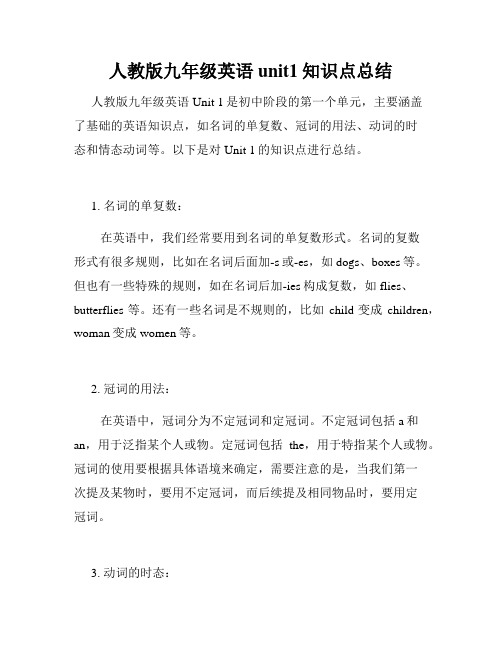
人教版九年级英语unit1知识点总结人教版九年级英语Unit 1是初中阶段的第一个单元,主要涵盖了基础的英语知识点,如名词的单复数、冠词的用法、动词的时态和情态动词等。
以下是对Unit 1的知识点进行总结。
1. 名词的单复数:在英语中,我们经常要用到名词的单复数形式。
名词的复数形式有很多规则,比如在名词后面加-s或-es,如dogs、boxes等。
但也有一些特殊的规则,如在名词后加-ies构成复数,如flies、butterflies等。
还有一些名词是不规则的,比如child变成children,woman变成women等。
2. 冠词的用法:在英语中,冠词分为不定冠词和定冠词。
不定冠词包括a和an,用于泛指某个人或物。
定冠词包括the,用于特指某个人或物。
冠词的使用要根据具体语境来确定,需要注意的是,当我们第一次提及某物时,要用不定冠词,而后续提及相同物品时,要用定冠词。
3. 动词的时态:动词的时态分为过去时、现在时和将来时。
过去时表示过去发生的动作或状态,常用的过去时的结构有一般过去时、过去进行时和过去完成时。
现在时表示现在或经常发生的动作或状态,常用的现在时的结构有一般现在时、现在进行时和现在完成时。
将来时表示将来要发生的动作或状态,常用的将来时的结构有一般将来时和将来进行时。
4. 情态动词:情态动词是特殊的动词形式,它们用来表示情感、能力、可能性、义务等。
常见的情态动词有can、could、may、might、shall、should、will、would、must等。
情态动词后面一般跟动词原形,表示对某个动作的推测、意愿、要求等。
5. 祈使句:祈使句是一种特殊的句型,用于表达命令、请求、建议等。
祈使句一般省略主语,用动词原形开头。
例如,"Open the door"表示"打开门","Turn off the light"表示"关掉灯"。
Unit 1 How can we become good learners?一单词textbook conversation aloud pronunciation sentence patient expression discover secret look up grammar repeat note pal physics chemistry memorize pattern pronounce increase speed partner born be born with ability create brain active attention pay attention to connect connect…with overnight review knowledge lifelong wisely二1.have a conversation with sb = communicate with sb.2.aloud/loud/loudlyaloud出声地;大声地。
常与read/ think/call/shout等词连用, 不用于比较级。
(think aloud自言自语) e.g. Don’t read aloud in the library. 不要在图书馆大声朗读loud ①大声地;喧闹地。
指说话声和笑声,常与talk/ speak/ laugh/ sing等词连用, 常用比较级。
e.g. We can’t hear you. Please speak louder. ② adj 大声的;响亮的 I couldn't hear what he said because the radio was so loud. 我听不见他说些什么,因为收音机的声音太大了。
loudly 高声地;喧闹地。
loudly 放在动词前后均可,还常与 ring ,knock 等动词连用。
可指人声、敲门声或其他各种声音,强调声音高、喧叫。
可以和loud互换,含有“吵闹”的意思,不悦耳。
Someone knocked loudly at the door. 有人大声敲门。
He spoke so loudly as to be heard by all. 他说得那样响好让别人都听见。
Don't talk so loudly. 别这么高声说话。
总结:aloud指出声地/大声地;用在修饰的动词之后loud大声的/大声地;常用比较级和最高级;loudly大声地;用在修饰的动词之前之后都可;敲门等其他声;嘈杂。
3.patie nt n 病人 adj 耐心的be patient with sb 对某人有耐心be patient to do sth有耐心做某事be patient of sth容忍某事4. the secret to sth/doing sthThe answer to the question The key to the doorThe way to my room The entrance to the building5. look sth up in a dictionary / look out/ body language/ the expressions on the faces/ key words /take notes/hide behind/an English movie called Toy Story= an English movie named Toy Story/fall in love with sth/help sb to do sth/as well/It’s a piece of cake/It serves you right/have a good(better)understanding of sth/the meaning of sth/get the pronunciation right/have sth in common6.Knowledge comes from questioning question在句子中作动词,是“质疑;质问;提问”的意思。
例如:I just accepted what he told me. I never thought to question it.当question用作动词,表示对某人或事物进行提问时,是一种十分正式的用法,有“提问;询问;审问”的意思。
例如:The police questioned him for three hours before letting him go7.be born with the ability to learn /be born with / the ability to do sth / be born in8.pay attention to sth/ doing sth be active in doing sth/ sthconnect sth with sth at a speed of9.by working with friends.. by making word card.. by reading the textbook..by listening to tapes by asking the teacher for help. by watching English movies.by reading aloud. by repeating out loud. by having conversations with friends.by doing exercises and reading a lot. ( 1.exercise泛指“锻炼”时,做不可数名词,如:take exercise 锻炼身体 take more exercise多锻炼2.exercise表示“体操”或“练习(题)”时是可数名词,要用复数形式.如: do morning exercises(做早操),do eye exercises(做眼保健操),do English exercises(做英语练习) )by writing e-mails to my pen pals.by taking notes in English. by reading English magazines.by keeping a diary in English. by using an English dictionary.10.How do you learn English? I learn by studying with a group.Do you learn English by reading aloud? Yes, 1 do. It helps my pronunciation.How can I read faster? You can read faster by reading word groups.How can I improve my pronunciation? One way is by listening to tapes.11.I don’t know how to increase my reading speed.“疑问词+动词不定式”作宾语what to do后不需要跟宾语how to do后必须跟宾语I don’t know how to do it. I don’t know what to do.12.increase/decreaseincrease to +增长后的结果(增长至), increase by+增长了多少13. discover多表科学探索发现(区别于invent);look for强调动作,寻找;find表结果,偶然发现;find out 表结果,经过调查发现。
14. by的用法总结a. 表示方式,方法,手段。
By +交通工具 , by bus. by+ doing sth by listening to the tapeb. by+时间到……时为止,不迟于。
注意:by+现在时间为现在完成时标志,by+过去时间为过去完成时标志c. by+地点,表示在什么旁边。
Stay by my side.d. by表示经过,如pass by\pass\go past, walk bye.表示抓着,接触身体的某一部分。
Catch me by the hand.f. 表示一个接一个 one by one,word by word. read word by word 逐字逐句地读 bit bybit/little by little一点点地,逐渐地15. listen to sth(sb)/ give a report16.what about doing sth=how about doing sth17.spoken English=oral English Speaking skills.18.It does help=It does work19.too+adj+to do sth太…而不能做某事He is too young to go to school.So+ adj+ that+句子如此…以至于可以做某事He is so old that he can go to school.adj+ enough+ to do sthHe isn’t old enough to go to school.He is too young to go to school.= He is so old that he can go to school.= He isn’t old enough to go to school.20.finish+doing more than = over, less than22.enjoy doing sthenjoy oneself=have fun = have a good time23. the +比较级+ 主 + 谓, the + 比较级+ 主 + 谓表示越….就越….The more you read, the faster you will be.24.be afraid/terrified of sth./doing sth.= be afraid/terrified to do sth.25.because of+n/because+句子 unless=if..not26 j oin/join in/take part in(1) join=be a member of 参加, 指加入某种组织,并成为其中的一员。